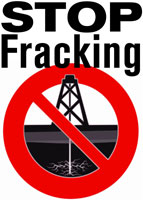
| Ban Fracking In Canada: Save Our Water | 14 March 14 |

Millions of litres of water are extracted every day from community watersheds across Canada to fuel this booming industry. There is currently no federal oversight to keep the industry in check, or to protect the health of people and our drinking water. The recent report, "Hydraulic Fracturing and Water Stress", shows the severity of the problem. Alberta and B.C. are among eight North American regions examined in the study by Ceres, a U.S.-based nonprofit advocating for sustainability leadership. One of the most disturbing findings is that hydraulic fracturing, or fracking, is using enormous amounts of water in areas that are short on water. The report notes close to half the oil and gas wells recently fracked in the U.S. "are in regions with high or extremely high water stress" and more than 55 per cent are in areas experiencing drought. Fracking is all about the short term profit and offers no comfort for the future borrowed from the coming generations. It is time to ban fracking in Canada. Sign the Petition here: Demand a Ban on Fracking in Canada View February 19, 2014 The Huffington Post articleView February 1, 2014 The New York Times article View February 2014 Ceres report View Lists of Fracking Bans Worldwide View New Brunswick Anti-Shale Gas Alliance website |
|
 Print version Print version |
Top |
